Supreme Court Allows Challenge To Law Against Election “Lies” To Go Forward
A hopeful First Amendment decision from the Supreme Court.
In a unanimous ruling, the Supreme Court held in a decision handed down today that a conservative group could proceed with its First Amendment challenge to an Ohio law that purports to ban false statements during political campaigns:
The court ruled unanimously that two advocacy groups could challenge an Ohio law that makes it a crime to make knowingly or recklessly false statements about political candidates that are intended to help elect or defeat them. The first offense could lead to six months in jail and the second could lead to disenfranchisement.
Lower courts had dismissed the case, saying the groups seeking to challenge it had not faced imminent harm sufficient to give them standing to sue. Justice Clarence Thomas, writing for the court, said the groups “have alleged a credible threat of enforcement” of the law and so were not barred from pursuing their challenge to it.
The case was brought by Susan B. Anthony List, an anti-abortion group, and Coalition Opposed to Additional Spending and Taxes. Both had sought to criticize Steve Driehaus, a Democrat, in the midst of what turned out to be his unsuccessful 2010 run for re-election to the House of Representatives. They asserted that his vote in favor of the Affordable Care Act could be interpreted as one “for taxpayer-funded abortion.”
The Supreme Court took no position on the truth of that statement.
Mr. Driehaus filed a complaint against the anti-abortion group with the Ohio Elections Commission, which makes preliminary determinations and can recommend criminal prosecutions. It issued a finding of probable cause that the group had violated the law. Mr. Driehaus dropped his complaint after he lost the election and before the case had gotten much further.
The federal appeals court in Cincinnati dismissed the groups’ suit challenging the law, saying they no longer had anything to worry about. In his opinion reversing that ruling, Justice Thomas said the groups had shown that they intended to repeat their critique of the Affordable Care Act against other candidates and that “the threat of future enforcement of the false statement statute is substantial.” That meant, he said, that their lawsuit could move forward.
Lyle Denniston summarizes the Court’s opinion:
If a state makes it a crime to issue false statements during an election campaign, as sixteen states now do, such a law is open to a constitutional challenge by a group once accused of violating it and at significant risk of being accused again, the Supreme Court ruled unanimously on Monday.
The decision appeared to break little new ground on the right to test in court a law that is claimed to interfere with rights of free speech under the First Amendment. The decision in Susan B. Anthony List v. Driehaus, however, said nothing about whether such a test should or would succeed in nullifying the law.
Ohio’s false statement law, at issue in this case, makes it a crime with punishment of up to six months in jail and a fine of up to $5,000 to put out campaign literature or advertisements that say anything known to be false about a candidate’s voting record. The law also assigns a state agency, the Ohio Elections Commissions, to police falsity in campaigning, with the authority to reprimand for violations.
Those two prospects — criminal prosecution and a commission probe — are enough in combination, the Court declared, to pose a significant risk that they will be used against activist groups that had faced an earlier complaint, and that plans to say again in the future the same thing that got them into trouble before.
It is not necessary, Justice Clarence Thomas wrote for the Court, that an actual complaint be on file before a group confronting that kind of risk can sue to get the law overturned in court.
This case involved two groups that are opposed to abortion, and that did — or planned to — go after a Democratic congressional candidate who had voted in favor of President Obama’s measure seeking a broad new reform of the nation’s health care system. The two groups’ message was that a vote for the Affordable Care Act was a vote in favor of spending federal taxpayer money to pay for abortions.
(…)
The U.S. Court of Appeals for the Sixth Circuit ruled that the two groups had not made a sufficient point that they actually faced prosecution or administrative review in the future, because it was not clear that the same factual situation would arise in a future campaign.
The Supreme Court overturned that result, concluding that both of the groups were sufficiently at risk of “imminent” prosecution or commission review as to enable them to file their First Amendment challenge. The Court, though, sent the case back for lower courts to decide whether the two groups could satisfy the other basic requirements for having a right to sue.
Eugene Volokh, Jonathan Turley, and Rick Hasan all have their won write-ups on the court’s ruling that are all worth reviewing for those interested in the subject. It’s important to note, though, that this case is far from the end of the Susan B. Anthony List’s legal claims against the State of Ohio. All the Court has decided here is that the SBA List has a credible First Amendment claim to permit it to go forward with a lawsuit, the ultimately goal of which would be to have the Ohio statute declared unconstitutional. However, the Court’s ruling, along with previous Supreme Court precedent on the First Amendment, seems to make it clear that the Court is suggesting that the statute should be viewed skeptically by lower courts, and that it would face a tough time if the case were to make it back to the Supreme Court for a decision on the merits.
Consider this from Justice Thomas’s opinion:
Respondents, echoing the Sixth Circuit, contend that SBA’s fears of enforcement are misplaced because SBA has not said it “‘plans to lie or recklessly disregard the veracity of its speech.'” … [But] SBA’s insistence that the allegations in its press release were true did not prevent the Commission panel from finding probable cause to believe that SBA had violated the law the first time around. And, there is every reason to think that similar speech in the future will result in similar proceedings, notwithstanding SBA’s belief in the truth of its allegations. Nothing in this Court’s decisions requires a plaintiff who wishes to challenge the constitutionality of a law to confess that he will in fact violate that law….
Finally, the threat of future enforcement of the false statement statute is substantial. Most obviously, there is a history of past enforcement here: SBA was the subject of a complaint in a recent election cycle. We have observed that past enforcement against the same conduct is good evidence that the threat of enforcement is not “‘chimerical.'” Here, the threat is even more substantial given that the Commission panel actually found probable cause to believe that SBA’s speech violated the false statement statute. Indeed future complainants may well “invoke the prior probable-cause finding to prove that SBA knowingly lied.”
The credibility of that threat is bolstered by the fact that authority to file a complaint with the Commission is not limited to a prosecutor or an agency. Instead, the false statement statute allows “any person” with knowledge of the purported violation to file a complaint. Because the universe of potential complainants is not restricted to state officials who are constrained by explicit guidelines or ethical obligations, there is a real risk of complaints from, for example, political opponents.
Finally, Commission proceedings are not a rare occurrence. Petitioners inform us that the Commission “‘handles about 20 to 80 false statement complaints per year,'” and respondents do not deny that the Commission frequently fields complaints alleging violations of the false statement statute. Moreover, respondents have not disavowed enforcement if petitioners make similar statements in the future. In fact, the specter of enforcement is so substantial that the owner of the billboard refused to display SBA’s message after receiving a letter threatening Commission proceedings. On these facts, the prospect of future enforcement is far from “imaginary or speculative.”
We take the threatened Commission proceedings into account because administrative action, like arrest or prosecution, may give rise to harm sufficient to justify pre-enforcement review. The burdens that Commission proceedings can impose on electoral speech are of particular concern here. As the Ohio Attorney General himself notes, the “practical effect” of the Ohio false statement scheme is “to permit a private complainant … to gain a campaign advantage without ever having to prove the falsity of a statement.” DeWine Brief 7. “[C]omplainants may time their submissions to achieve maximum disruption of their political opponents while calculating that an ultimate decision on the merits will be deferred until after the relevant election.” Moreover, the target of a false statement complaint may be forced to divert significant time and resources to hire legal counsel and respond to discovery requests in the crucial days leading up to an election. And where, as here, a Commission panel issues a preelection probable-cause finding, “such a determination itself may be viewed [by the electorate] as a sanction by the State.”
Although the threat of Commission proceedings is a substantial one, we need not decide whether that threat standing alone gives rise to an Article III injury. The burdensome Commission proceedings here are backed by the additional threat of criminal prosecution. We conclude that the combination of those two threats suffices to create an Article III injury under the circumstances of this case
Based on this, it seems hard to believe that the law itself would fare well on the merits.
As I noted when I’ve written about this case before, most recently when the case was getting set to be argued before the Court back in April, the dangers of a law such as this seem so readily apparent that it’s hard to see how it could pass First Amendment scrutiny. While there are certainly some circumstances where false statements during the course of a political campaign would give rise to civil claims for defamation or slander. However, that is a far different matter from the idea of a government commission such as the one in Ohio that is charged with the task of determining whether statements made during the course of a political campaign are true or false, and given the authority to impose criminal sanctions if a statement is indeed deemed to be false. The chilling effect of such a “truth commission” would seem to be readily apparent. More importantly, while the scope of the First Amendment is often a subject of contention and debate, one of the few areas where it is uncontested is the idea that a primary purpose of the amendment was to permit for as much free speech in the political sphere as possible. A law like this obviously goes against that principle and discourages people from speaking out during the course of a political campaign for fear that they might be dragged before a commission that could hold them to have committed a criminal act. For that reason, I would hope that this law is dealt with harshly when it is considered on the merits.
It may be some time before we hear about this case again. From here, the case will go all the way back to the District Court level for pre-trial proceedings and, eventually, trial. After that, one would expect and appeal to the Sixth Circuit by whomever happens to lose at the trial court level. Realistically, the earliest this case would be back before the Supreme Court would likely be the term that begins in October 2015.
Here’s the opinion:
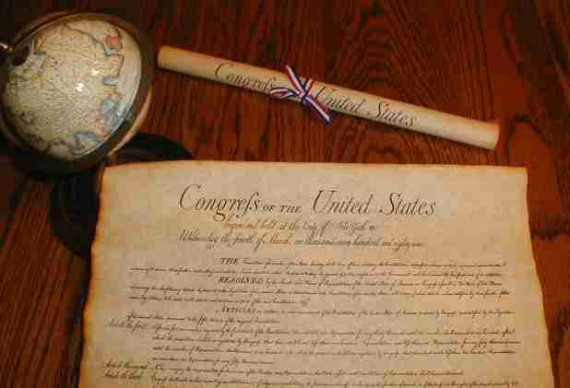

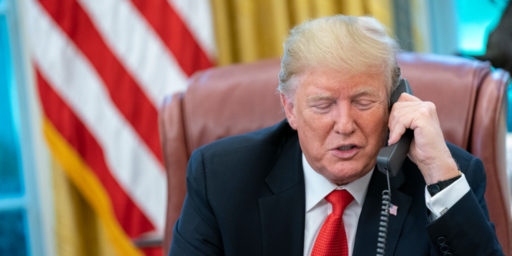

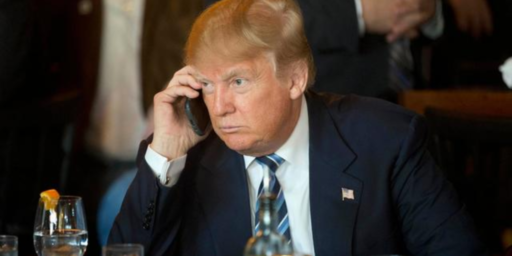
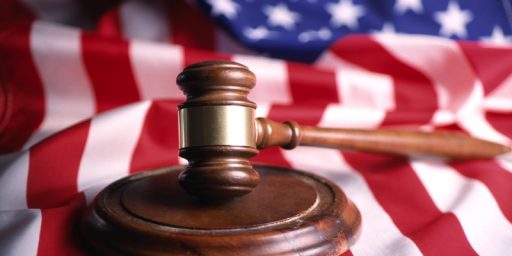
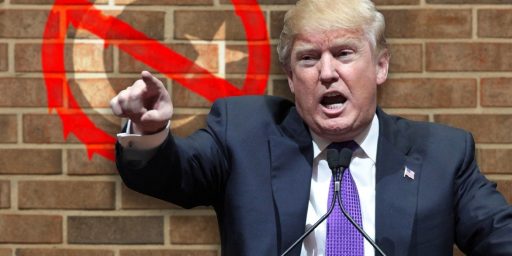
Google Jane Akre.
Fox News went to court and won the right to lie on the public (cough) airwaves. Something about covering Monsantos ass.
I expect the same from the Roberts court.
Doug –
As a non-lawyer, please allow me to ask the simple – yet obvious – question: If an individual, or group, says that “Candidate X was responsible for Y”, or, more specifically, “John McCain fathered a black child” and it can be proven that Candidate X has/had nothing to do with Y nor that John McCain fathered a black child, why should the individual or group be allowed to lie to the public like that without any sort of repercussions?
Eddie,
That is what the law of defamation is for. This shouldn’t be something that the criminal law concerns itself with
@EddieInCA:
Should I be allowed to say “O. J. Simpson murdered his ex-wife” in public without any sort of repercussions?
@Stormy Dragon:
Again, that is what the law of defamation, as well as the related laws on libel and slander, are about.
If you make a false claim about O.J. Simpson, then he has the right to pursue a civil claim against you. Of course, in such a case truth would be an absolute defense and he would have to prove that he suffered damage as a result of any false representation.
@Doug Mataconis:
My point is that the truth/falseness of a statement is often rather fuzzy in the real world. Is that statement true or not?
@Stormy Dragon:
That’s exactly why such matters should not be subject to criminal prosecution.
Yes it’s defamation – but it’s more than that. It’s a form of tampering with an election. A civil action won’t shut down the activity fast enough and there is enough dark money out there to make the threat of an action negligible.
Even so, I fully expect the Roberts Court to err on the side of buying off the democracy.
@Anonne:
The answer to incorrect speech is more speech, not criminal prosecutions
Doug, how do you differentiate between this kind of lying and fraud? I’m pretty sure there isn’t a first amendment right to defraud people.
@HankP:
Fraud requires a false statement made with the intent that a person rely upon it, detrimental reliance, and actual calculable damages,
That isn’t going to exist in the political context in nearly every conceivable case. And in those cases where it does, there are already laws against fraud.
@Stormy Dragon:
Sorry. I missed the office that OJ Simpson ran for at any time in his life. The case is SPECIFICALLY about politics and elections. Can you give me an equivalent question with the context of an election?
HIlary Clinton had Vince Foster killed.
John McCain fathered a black baby.
Barack Obama was born in Kenya.
Laura Bush killed a classmate in high school. (this one is true)
@Doug Mataconis: Not trying to be a pain here, but unless you consider political representation and the effects of political decisions valueless each of those items could be involved in the case of a politician lying to gain office or to prevent an opponent from gaining office. I know politicians write the laws to favor themselves (and the judiciary usually upholds them), but this seems ridiculously blatant.
@HankP:
As I state in this post and others covering it, I think the potential costs of vigorous enforcement of something like the Ohio law far outweigh the dangers that a politician might tell an untruth during the course of a political campaign.
This seems like it might be a case of the solution being worse than the problem. I can understand the impetus behind the law. The lies work and as long as they do and there are no substantial consequences, the liars will keep lying to the detriment of all of us.
@Doug Mataconis:
The danger isn’t so much that a politician might tell an untruth, it is that outside groups loudly and repeatedly tell lies on billboards and public airwaves that unduly influence elections.
@Doug Mataconis: Yeah, I hate to say it, but they got it right this time.
@grewgills: No, the real danger is that lawyers will stop elections from occurring while the truth is litigated. (lawyers always get the blame)
Really guys, think about it: Who decides what the truth is? We all love to complain about climate deniers but imagine the clusterpuck when a bunch of intelligent designers convince the Attorney General of Oklahoma to file charges against a paleontologist.
Do you really want to open up that door?
@EddieInCA:
Is it? She was never charged, much less convicted. If it comes up before the “truth commission”, which way do they decide? What’s the criteria for “truth”?
@EddieInCA:
I picked OJ as an example where the truth as determined by official process is in conflict with what 80% of the public believes to be true, and it’s hard to say the public isn’t right. It’s also a case of a fact that would seem to be entirely objective (you either murdered someone or you didn’t, you can’t maybe murder someone) yet in the real world is often hard to definitively determine one way or the other.
@Stormy Dragon:
http://www.snopes.com/politics/bush/laura.asp
@EddieInCA:
Oh I realize the accident happened. Whether that means she killed someone is up for debate though.
@OzarkHillbilly:
That is the danger on the other side, which is why I said that in this case the solution is probably worse than the problem.
@Stormy Dragon:
No, it isn’t. To kill simply means to cause someone’s death. She ran a stop sign and that caused a boy’s death, so she did kill him. If someone were to say she murdered someone or that she intentionally killed someone, that would be a different story.
@Stormy Dragon:
No. It’s not up for debate. She certainly did “kill” him. She did not “murder” him, however. Killed him? Definitely. Not up for debate.
Larger point is that lying in an election is much more than just defaming someone. It’s defrauding the electorate of being able to make an informed choice. And I don’t see how that is ever good for a democracy.
@Doug Mataconis: “The answer to incorrect speech is more speech, not criminal prosecutions”
Of course, to the Roberts court, the only “incorrect speech” is a donation of less than a million dollars.
So, would Obama’s constantly redefining his history with William Ayers during the 2008 camptign be actionable?
Hillary’s story of dodging sniper fire in Tuzla?
Harry Reid saying Romney hadn’t paid taxes in ten years?
Joe Biden saying… well, pretty much anything?
As tempting as all this is, it’s still unconstitutional. It’ll just provoke a war of who gets to appoint the Truth Cops. As Doug said, as Alan Dershowitz says, the best answer to bad speech is more speech.
@EddieInCA:
I agree with that is a goal. The problem is that I don’t see away of implementing it that doesn’t end up becoming away for the in power party to punish the out of power party for saying things they don’t want them to say regardless of whether they’re actually truthful or not.
@Doug Mataconis:
Yes, but money is speech, so some people have more speech than others. So when someone with more speech is allowed to lie quite brazenly and without recourse (American law really does not allow politicians to sue for defamation – this is not the UK), then freedom of speech really does not exist.
@wr: Touche!
@Stormy Dragon:
and this is the nut of the issue.
@Xenos: Which is exactly how John Roberts wishes it to be.
In its majestic equality, the law forbids rich and poor alike to sleep under bridges, beg in the streets and steal loaves of bread. -Anatole France. See, all equal.
I think it’s fairly obvious that the 1st protects the right to lie…as that is speech…and the Ohio law, while well intentioned, is flawed.
The only thing this ruling does is settle the fact that you simply cannot believe anything the Susan B. Anthony List or the Coalition Opposed to Additional Spending and Taxes says.
This is an interesting conundrum. I find I must side with Doug on this one as the potential repercussions of such a law would be magnificently disastrous in all its unintended glory. Perhaps the answer is to beef up the defamation laws instead in such a manner that it accomplishes the same task (preventing lies from swaying an election and thus committing fraud) without the 1st challenge. Hmmm, some sort of optional contract or buy-in wherein the candidate and his campaign staff all sign a voluntary “gag order” and agree to something similar in nature to this law – thus serving as an additional certification and bragging right for the candidate that he’s the new Honest Abe? A charge against an opponent could be that less then 50% of his staff agreed to the “Honesty Clause” and let the public decide how they feel about that. Not a lawyer so I’ll have to ponder this…..
This seems unnecessarily harsh consider what else you can do in America and still have the right to vote. A better penalty would be that if a candidate’s campaign knowingly commits a defamatory action, it could lead to removal of office? Multiple offenses could lead to barring for life. It would sure make for some accountability in the ranks if Johnny the PR Guy costs Senator-to-be Bob his job due to some less the honest remarks to the media.
@KM:
Well…the real answer already exists…it’s called an actual functioning 4th Estate.
Journalists should be all over situations like this…do their job and call bullshit…then the SBAL would learn it can’t get away with crap like this.
Think of all the other lies, which have led to real consequences, that never should have gotten traction…Climate Change denial, Death Panels, WMD in Iraq, tax cuts on the rich, austerity in the face of recession, birtherism, trutherism.
The problem with reliance on defamation laws, as Doug suggests, is that it would be almost impossible to prove damages. Also, by the time the lawsuit finds its way to court, the elction would have been over for a year or so. I suppose an injunction could work, but even there, you have to get into court, prove irreparable harm, get the order, and then enforce it. Ads only last a few days, typically (then social media runs with it).
@C. Clavin:
THIS! If only we had that.
@KM:
Maybe a mega Snopes, each candidate could get the mark on their ads certifying them lie free, sort of like dolphin safe tuna.
@pylon:
That’s why “more speech” is not effective. You have billionaires pouring tons of money into races and spreading lies and misdirections, with no consequences, and an injunction won’t stop the damage done once the cat is out of the bag. Nothing else has any real teeth. Criminal laws at least change the incentives, they put the onus on them to be truthful even if they leave out context; relying on the civil law does nothing except feed lawyers post hoc, as people can lie and say anything with impunity.
@C. Clavin:
and a pony.
“Freedom of the press is guaranteed only to those who own one.” – A. J. Liebling